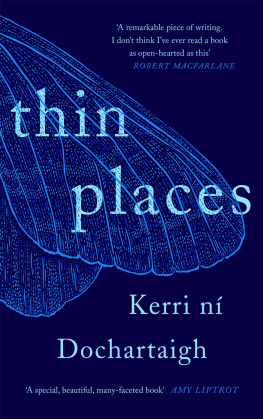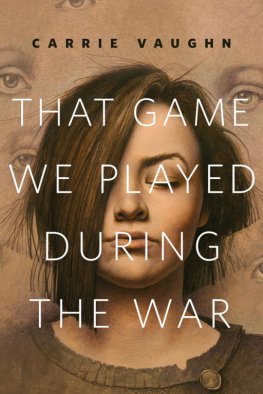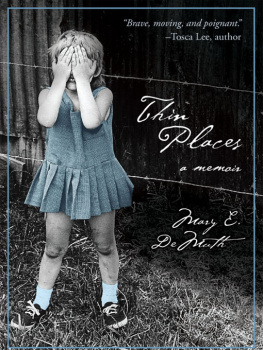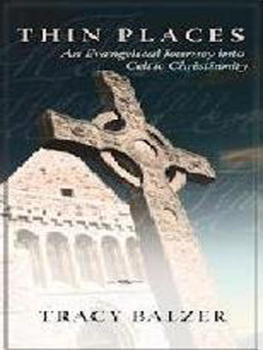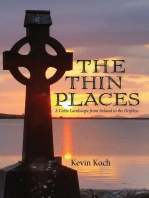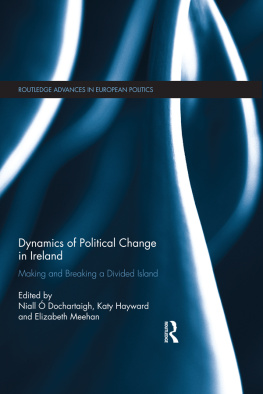Kerri ni Dochartaigh - Thin Places
Here you can read online Kerri ni Dochartaigh - Thin Places full text of the book (entire story) in english for free. Download pdf and epub, get meaning, cover and reviews about this ebook. publisher: Canongate Books, genre: Religion. Description of the work, (preface) as well as reviews are available. Best literature library LitArk.com created for fans of good reading and offers a wide selection of genres:
Romance novel
Science fiction
Adventure
Detective
Science
History
Home and family
Prose
Art
Politics
Computer
Non-fiction
Religion
Business
Children
Humor
Choose a favorite category and find really read worthwhile books. Enjoy immersion in the world of imagination, feel the emotions of the characters or learn something new for yourself, make an fascinating discovery.
- Book:Thin Places
- Author:
- Publisher:Canongate Books
- Genre:
- Rating:3 / 5
- Favourites:Add to favourites
- Your mark:
- 60
- 1
- 2
- 3
- 4
- 5
Thin Places: summary, description and annotation
We offer to read an annotation, description, summary or preface (depends on what the author of the book "Thin Places" wrote himself). If you haven't found the necessary information about the book — write in the comments, we will try to find it.
Thin Places — read online for free the complete book (whole text) full work
Below is the text of the book, divided by pages. System saving the place of the last page read, allows you to conveniently read the book "Thin Places" online for free, without having to search again every time where you left off. Put a bookmark, and you can go to the page where you finished reading at any time.
Font size:
Interval:
Bookmark:

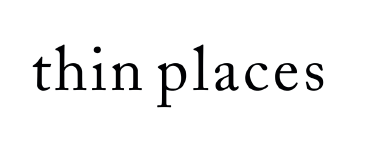
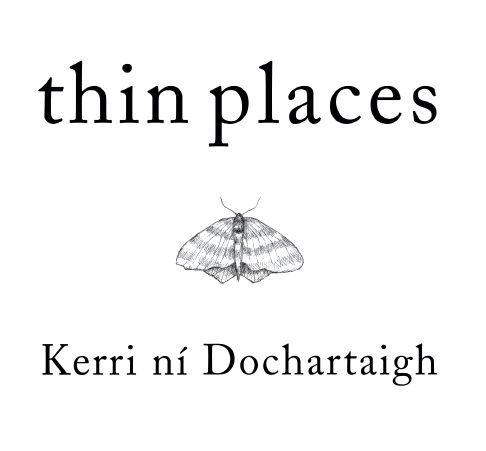

Caution: this book contains references to violence,addiction, depression and suicidal ideation.
First published in Great Britain in 2021
by Canongate Books Ltd, 14 High Street, Edinburgh EH1 1TE
canongate.co.uk
This digital edition first published in 2021 by Canongate Books
Copyright Kerri n Dochartaigh, 2021
The right of Kerri n Dochartaigh to be identified as the author of this work has been asserted by her in accordance with the Copyright, Designs and Patents Act 1988
British Library Cataloguing-in-Publication Data
A catalogue record for this book is available on
request from the British Library
ISBN 978 1 78689 963 7
Export ISBN 978 1 83885 451 5
eISBN 978 1 78689 962 0
for the people,
for the places,
for those lost,
for those moths.
Contents
Prologue
W HEN I FIRST SEE HER she is as still as a found stone, in an ancient and hidden place. She stands out, a quiet caller of the eye her markings blend in so delicately in this place, against the grasses and the thistle, the sand that marks the Atlantic Ocean from the land. I am at An tSribh Shroove Beach completely alone, miles across the border from my home in Derry, when we cross one anothers path.
She looks so calm, unstirring in spite of the winds that now set the tall grasses on the beach to dance. She is so beautiful I may even call her celestial that I almost feel I have no right to be here. In this moment, in this place, with this graceful wonder, what part can I play in her story, in the narrative of this ethereal offering of a creature? I begin to feel that I am not, in fact, even seeing her. It is more an act of witness. There is so little action in the small part I play on this near-winter morning, at a part of the Inishowen Peninsula where Lough Foyle meets the wild Atlantic, at the edge-land of Donegal, in one of the most northerly places on the island of Ireland.
We have found ourselves in a state of turmoil here, in the North of Ireland, and all the other parts that make up the United Kingdom are caught up in the same storm. It is November 2019, and next month the first Christmas Election in decades will take place. The air has been charged for many months with worry and confusion but none of that seems real, here, amidst such silent serenity.
She dances. She is the centre of it all, the still point on the map, a heavenly and delicate thing, too sacred for words. I am only the beholder, here, and I am drinking it all in. I bathe in her silent, gossamer grace. I watch her for what feels like a hundred years one hundred years and this one, solitary day. The winter sun is high enough above the lighthouse to make the reeds double on themselves. Their silhouettes now join her in shadow play; they seem as if they are weaving themselves together and dancing in time with her. I am on my own, on the outside, looking in at the reeds and the moth; as if I am on the other side of an ice-sculpted lake or a mirror. They are right here beside me yet they feel so completely out of reach.
I tiptoe around the edges, and I feel myself outside time, as well as place. Now I am in both and in neither all at once.
I gratefully wait on the threshold, holding my breath as the reeds dance, grass goddesses on the hushed dunes, beside an ethereal, exquisite leamhan.
A winter moth, in a weightless, willowy place.
I begin to dry myself. The water today was icy and the seas waves tall and white as snow, like mountains she had given birth to overnight. I am shivering, now, violently, on the wet November sand, but I feel like I have been made new, somehow. There is almost full silence. All that undoes it are the soft sounds of the dreoiln a wren and the water as it ebbs and flows out at the horizon.
Then, all out of nowhere a deep, melancholy cry rings out over the dunes. A call that speaks of wildness, of solitude, of survival and unimaginable beauty. Twelve curlews are in flight in the sky above my head, calling out over the edges of the eastern coast of the Inishowen Peninsula. They are the same colour as the dunes, the grasses and the other winged creature on the beach, that almost otherworldly moth. Their call is haunting a siren song written long ago, and it drags me with it: out of myself, and back in again out and in, like a wing-beat, or ebbing breath.
They have long held a place in our history as a marker, these folkloric birds: of the past, of the cruel and melancholy passing of time with all its irrevocable changes. The curlews cry has shape-shifted into mournful lament an elegy for all that is lost. For centuries, it has been taken as a sign of unbidden sorrow yet to come; the cries of those whistlers is a sound steeped in foreboding. Those creatures of coast, marsh and bog carrying disaster and grief, carefully, in the fine curves of their bills. This beach on which I stand, shivering and silvered by the salt of the Atlantic Ocean, is a perfect place for them open, empty and desolate, at first glance. This beach Shroove, Stroove, or Strove, depending on where you grew up has a quality to it, a stillness, which lets me almost float away. It allows me to see things differently. It is as if the veil between worlds has become as thin as moth-wing. The lines that are normally drawn for and by us between here and there, between now and then seem as though they have been washed away, on some days. I shiver again, pull my arms in around the curve of my body and wonder if it is the sea that has made ghosts of what we think we know here, in this wee nook at this most northerly tip on this divided, broken island.
This shipping lane has been used for hundreds of years by ships carrying Irish emigrants to land far from where I stand England, America, Australia, Canada. This rugged coastline has not only transported people, it has stolen them, too. She is a hungry sea, this one I am drawn to pulled towards, tidally. She has claimed hundreds of ships, taken innumerable lives; the body of water in front of me holds a story of deepest loss within her belly.
Now, through the lifting mist, Ballycastle in the north of Ireland comes into view, only just. One moment the coastline is there, and then it isnt. It is a fleeting and flighty thing today, the outline of that other place across the sea and border from me. There are times at which, under certain conditions, Scotland can be seen from where I am standing, as clearly as if it were right there in front of you, as if you could hold it tenderly inside your own salty, shaky hands. Today is not one of those days. The only land that I can see from here is still in Ireland, across an invisible border, parts of both its sides are held in place by the ancient, changeable and wild Atlantic in front of me. This border unseen, hand-drawn by man, and for him alone, too has been the thread that has run through my life. A ghost vein on the map of my insides, it is a line that is political, physical, economical and geographical; yet it is a line I have never once set eyes upon. This invisible line a border that skims the water I have just emerged from, as though it were a dragonfly has been the cause of such sorrow and suffering, such trauma and loss, that I ran from its curves and coursing flow at the very first chance I got.
Font size:
Interval:
Bookmark:
Similar books «Thin Places»
Look at similar books to Thin Places. We have selected literature similar in name and meaning in the hope of providing readers with more options to find new, interesting, not yet read works.
Discussion, reviews of the book Thin Places and just readers' own opinions. Leave your comments, write what you think about the work, its meaning or the main characters. Specify what exactly you liked and what you didn't like, and why you think so.

